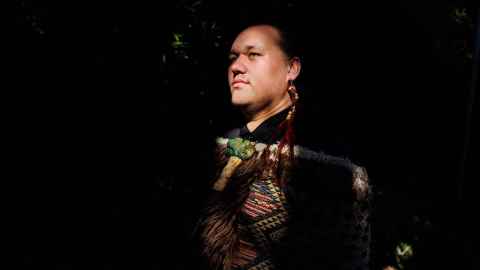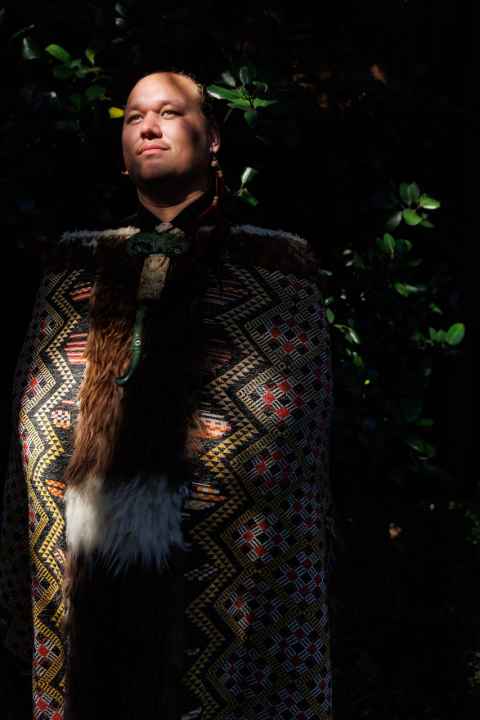Kura kaupapa Māori, where Rangatira are made
9 May 2024
After being immersed in te āo Māori throughout his life, Hikawai Te Nahu reflects on how his kura kaupapa Māori roots have held stong as he navigated the world of mainstream tertiary education.

Born and raised in Rotorua and immersed in te āo Māori his entire life, Hikawai Te Nahu packed his bags for Waipapa Taumata Rau, University of Auckland in 2019, leaving behind the richness of his Māori community lifestyle.
Hailing from Ngāti Whakaue, Ngāti Rangiwewehi, Ngāti Porou, Rongomaiwahine, Te Aitanga ā Hauiti, and Ngāti Te Whatuiāpiti, Hikawai graduated on 8 May with a conjoint Bachelors in Arts and Science.
During his studies, Hikawai focused on rangatiratanga (leadership) and kaitiakitanga (guardianship) of Aotearoa New Zealand's freshwater systems, blending his interests in Māori Studies and Environmental Science.
His commitment to these areas is reflected in his diverse studies and work, from his role as a reo teacher and tikanga adviser for the University, to working with his iwi at Te Arawa Lakes Trust, where he hopes to improve the region's freshwater systems in keeping with his dedication to his culture.
He is an internationally recognised kaihaka, making it to the finals of Te Matatini 2023, the world's largest Indigenous performing arts festival, where he tied for second place with Te Kapa Haka o Ngāti Whakaue.
He also won the Te Arawa Regionals in March 2024. While balancing his studies, Hikawai set tour for Italy and Taiwan with his kapa performing at various festivals.
He was a recipient of the 2023 University of Auckland’s Blues Awards in the Culture category. This was a nomination from the University’s Pro Vice-Chancellor Māori office, in recognition for his passion for haka and willingness to bring the mana of Māori culture to a predominantly Western institution.
Hikawai attributes all his successes to his te āo Māori background and kura kaupapa Māori Aho Matua upbringing.

The core of our curriculum is the health and well-being of the student, their wairua, and their identity. This is how success is made – everything else comes second.
As a proud kura boy, Hikawai says: “Kura Kaupapa Māori is where rangatira are made.
“Kura kids are equipped from an early age to understand the value of our identity. Our physical, academic and spiritual skills are all nurtured.
"So, when we venture off into the world, we never lose sight of our ahurea, our whakapapa, and our tuakiritanga – this keeps us well grounded, giving us a strong foundation to withstand life's challenges.
“In one of my essays for Māori Studies, I discussed the importance of movements like Te Petihana Reo Māori (1972), the Kohanga Reo movement (1982), and the Kura Kaupapa Māori movement (1985). These movements all played a role in the Te Reo Māori Renaissance, of which I was privileged to reap the benefits.
"But history aside, the core of our curriculum is the health and well-being of the child, their wairua and their identity. This is how success is made – everything else comes second.”
Hikawai is proof of that, earning himself NCEA level 1, 2, and 3 with excellence, at the age of 15.
Reflecting on his first years at the University, Hikawai instantly noticed the difference in learning methods and lack of relationship building within a Western institution.
“I took language papers as a way of staying grounded. Naturally I was becoming physically detached from my home so taking te reo Māori papers seemed appropriate,” he says.
“But it was so strange!” he says. “Learning my own language through a Pākehā way of teaching.”
This experience marked the start of a journey where he began to unpack the benefits of a Māori education system. The focus through his studies was to provide a lens that enhanced te āo Māori learning, ways of knowing and being.
“That’s why programmes like Tuākana are important to bridge the gap in cultural competency because it has an impact on our learning. It is a form of te āo Māori learning, fostering a tuākana-teina relationship.”
He says the recent debate about whether Māori and Pacific students should have special study spaces was interesting.
“It amuses me to see how some people spend so much energy finding more and more silly things to complain about us Māori and Pacific people.
“Having a solid support system is a way of life for us. It’s a way to stay connected, establish good networks and relationships, and to have a community that unconditionally supports you.”
For Hikawai, that support system is Ngā Tauira Māori (NTM), the Māori Students Association, recognised as an incubator of Māori leaders by the University.
“I really struggled in my first year in terms of the type of learning environment I stepped into. But then I met members of Ngā Tauira Māori who recognised me from Rotorua. The thing about Māori is that there’s always someone who knows someone who knows someone who knows you.”
Hikawai acknowledges university can be seen as a barrier for kura kids but says kura kids are more than capable.
“It can be tough coming from a small classroom where the student-teacher ratio meant each student got some good one-on-one time, to then attend a university where there are sometimes up to 200 studentsin a class.”
Where to next?
Hikawai emphasises the importance of maintaining cultural connection while navigating different educational spaces. Combining his passion for Mātauranga Māori with Western scientific methods, Hikawai is keeping his options open to working in environmental science, marine science and sustainability. In particular, he wants to help address issues like climate change and freshwater management within the Te Arawa region.
"Mātauranga Māori partnered with Western methods of science can create actionable solutions that are important to Māori," he says. "But the more I explored in my studies, the more it affirmed what Māori have known for generations."
He has deferred his masters degree for the time being, to consider opportunities ranging from travel to furthering his academia career. He has just returned from Taiwan and heading back to Italy next week to commemorate the 28th Māori Battalion.
He wants to spend some time doing things that he enjoys.
“At the moment, I’m just happy to be back home to focus on tā moko, mahi toi, and pursuing things that fill my wairua cup."
Media contact
Te Rina Triponel | Kaitohutohu Pāpāho Māori
E: te.rina.triponel@auckland.ac.nz